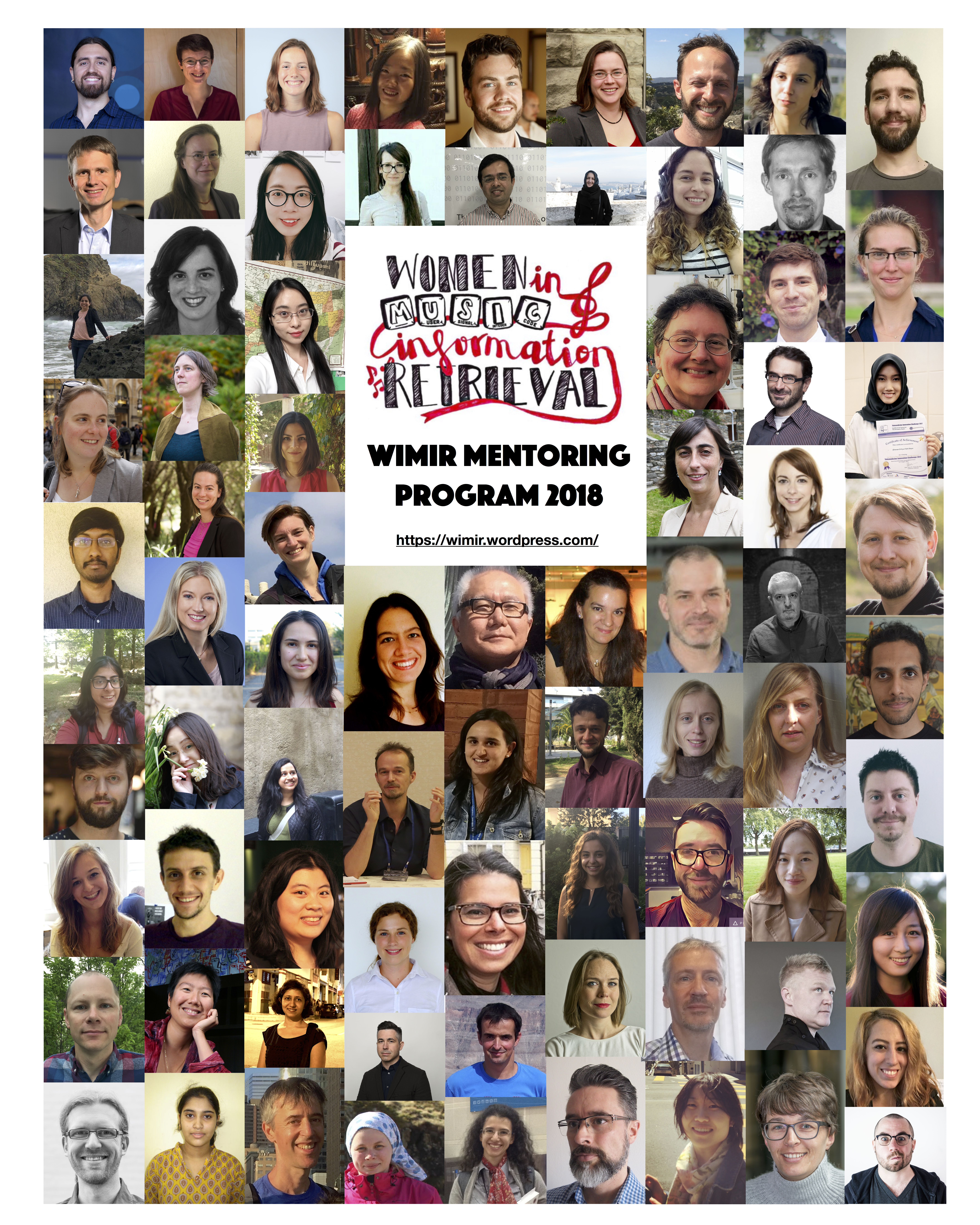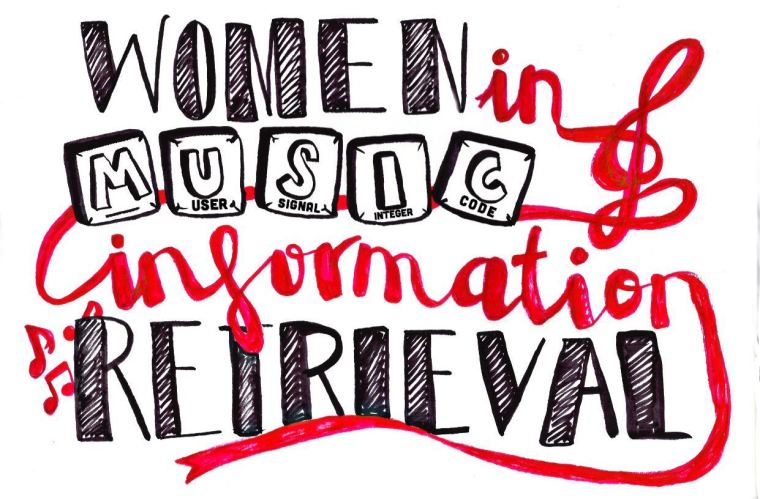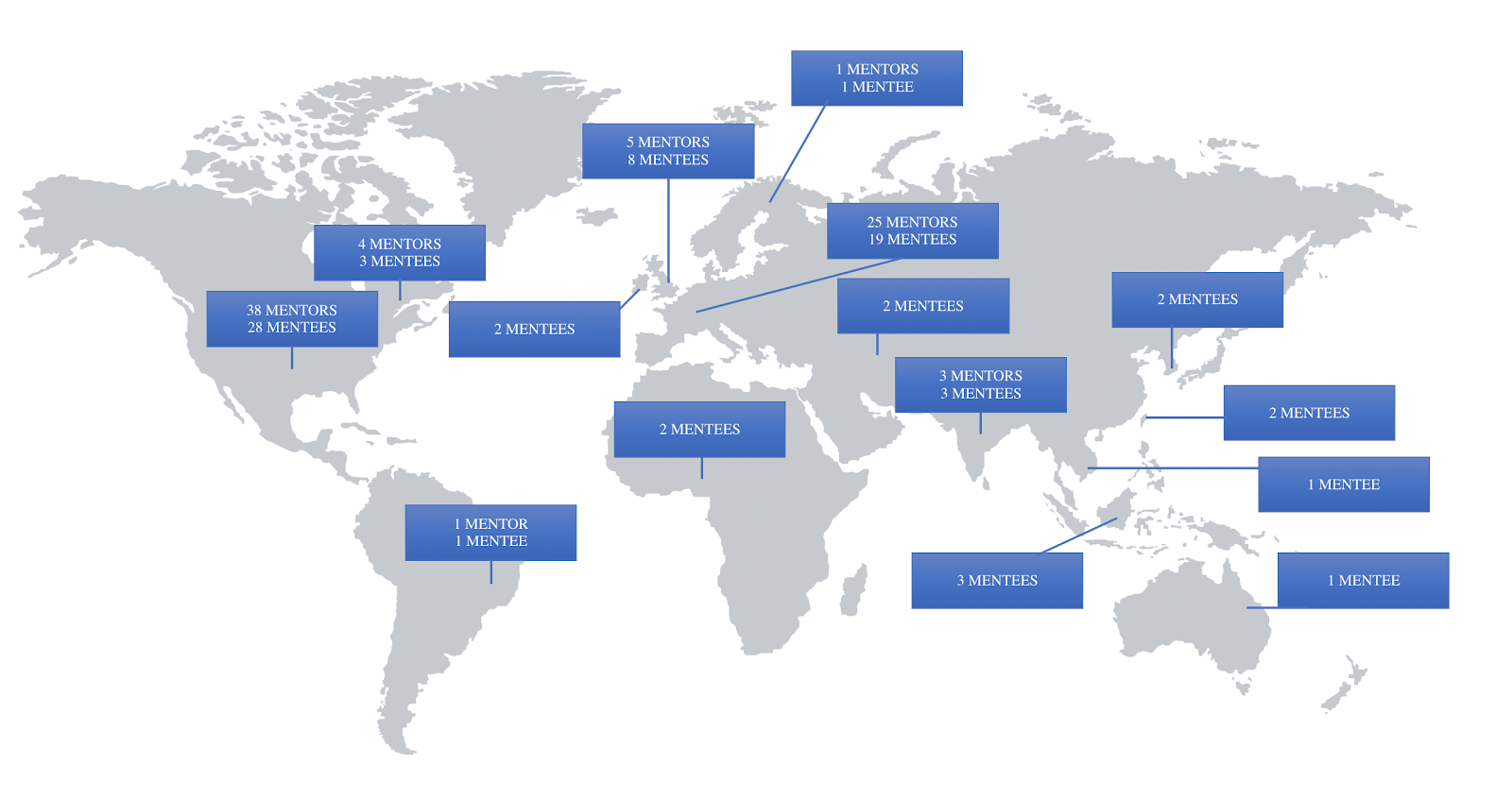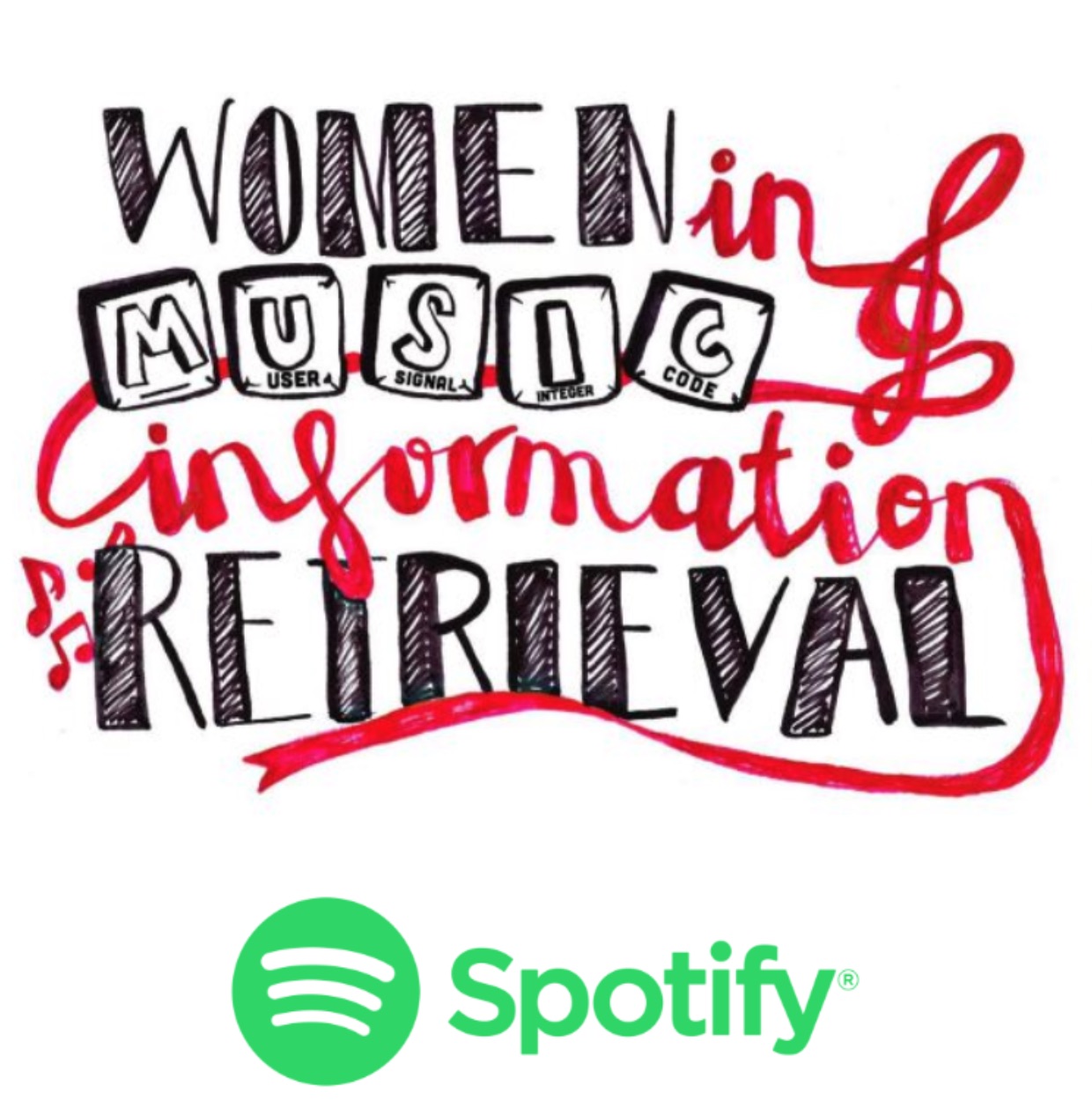
Poster design: Julia Wilkins
Blog post by Anja Volk (Utrecht University), Co-Founder of the WiMIR Mentoring Program
“This is the only hour-long meeting on my calendar that I secretly wish would last longer.” Let’s take this quote from a mentor’s anonymous feedback on his/her experience with the WiMIR mentoring program as the opening fanfare to our report on the outcomes of the 2018 mentoring round as reflected by the participants. I can hardly think of any bigger compliment to this program from the perspective of a busy mentor. Before looking into what other mentors and mentees told us in their anonymous feedback about their experience with the program, allow me some remarks on reports in the field of Music Information Retrieval.
We love big numbers in Music Information Retrieval – we are fans of analyzing millions of musical pieces and reporting statistics. Accordingly, our report on the WiMIR mentoring round in 2018 might deal with a lot of numbers, such as the fact that the number of participants has doubled again as in previous years, with 80 mentor-mentee pairs enrolling this time, while participants came from Europe, North and South America, Asia and Oceania. Or we might count how the list of academic institutions participating has only grown since the first round in 2016, with about 70 institutions participating in 2018, and that we have meanwhile mentors from most of the leading music technology companies and even AI and music startups, adding up to about 40 companies. You can check that out here.
However, let’s take in this report the musicologist’s approach of giving great care to details, analyzing one piece after the other (and not necessarily millions at once) and let’s listen to one piece at a time, or better to one story at a time on how the mentees felt empowered, gained career perspectives, came to appreciate the MIR community and felt encouraged and included through the mentoring sessions. These individual stories might give a more detailed picture on what has been gained than plain numbers.
For a description of the general format of the WiMIR mentoring program, with 4 remote meetings between mentor and mentee, you can check out last year’s report here.
Exposition first theme
Outcomes from mentoring sessions on career perspectives as reported by mentees
The following anonymous quotes provide an overview of how mentees were able to gain clarities and perspectives on their career options in MIR.
Not only has the WiMIR mentoring programme opened up opportunities for me to study it and work abroad, experiencing other universities, it has built my confidence with networking with more senior academics.
I already told this to anyone I met working in wide ranged related fields. This is the best way to find your path to learn or make career goals.
With his guidance, I found my path through my best interests in both academic and industrial ways.
I have more clarity on my career path.
Discussing with a successful woman in this field was very interesting so that I could ask specific questions about my work/life path that would help me making decisions for my future career.
It deepened my understanding on research from the perspective of a big picture.
The program provides an important channel for research and career information exchange, which means a lot for early-stage researchers.
Sign up for the WiMIR mentoring programme because TRUST ME you will NOT regret it. It’s the best thing I have done for my future within my PhD.
Exposition second theme
Specific outcomes from mentoring sessions on career perspectives as reported by mentees
Quite a range of different projects have emerged from the mentoring sessions this year, from landing a job to programming skills, writing CVs, papers or research proposals, or getting an internship. Here are some examples.
I got a new job in the industry that relates to music! My mentor helped with all of the positive support and encouragement!
So, thanks to my mentor, I applied to the WiMIR Grant Application at the ISMIR Conference 2018.
I was able to land a job that combines music and computer science and I’m really excited to be making a difference in the music world from a variety of areas!
I received valuable feedback on my job materials such as my CV and a cover letter.
I learnt handy programming tricks.
I wrote and submitted a fellowship application (which got through to the final shortlist for the award).
I’ve learnt how to define and narrow a research problem and how to solve it step by step.
We could come up with a collaborative work on which we are currently working.
I presented a paper that I was working on for feedback to students/ faculty at University X.
I finally created a personal website.
Received help with a conference proposal and acceptance for conference.
Time saving! Great to have someone to help make yes/no decisions about whether opportunities are worth chasing or not.
Received help shaping my dissertation topic.
Started collaborating for a new paper.
Development
Encouragement, encouragement, encouragement
An underlying topic that recurs over the editions of the mentoring program since 2016 is that of encouragement for mentees. Why is that so important? The psychiatrist Anna Fels has shown that ambition is built on two components: 1) mastering a skill, and 2) being recognized for it. Fels has demonstrated that being recognized by others for their skills happens to a much smaller extent for girls and women than for boys and men: “The personal and societal recognition they receive for their accomplishments is quantitatively poorer, qualitatively more ambivalent, and, perhaps most discouraging, less predictable.” Unfortunately, this starts already early for girls at schools: “Despite the fact that girls’ and women’s achievements, particularly in the academic sphere, frequently outstrip those of their male peers, they routinely underestimate their abilities. Boys and men, by contrast, have repeatedly been shown to have an inflated estimation of their capabilities. Paradoxically, these inaccurate self-ratings by both women and men seem to be accurate reflections of the praise and recognition they receive for their efforts. The impact of these findings on the selection and pursuit of an ambition is obvious: If you don’t think the chances are great that you will reach a career goal, you won’t attempt to reach it—even if the rewards are highly desirable.” (quotes from Anna Fels’ Harvard Business Review “Do Women Lack Ambition?”) More and more empirical studies reveal the different contexts in which women receive less recognition for the same skills as their male peers, such as the study by Moss-Racusin et al. (2012) which has shown that both male and female faculty rated male applicants as significantly more competent than women with identical application materials, and a study by Reuben et al. (2014) showing that both men and women were twice as likely to hire a man for a job that required math than a woman for that same job, even though the women performed equally well in an arithmetic test. Seeing, recognizing and rewarding the skills and talents of women seems to be an important ingredient to learn for all of us.
The WiMIR mentors pay an invaluable contribution toward encouraging mentees to follow their ambitions by doing exactly this: Seeing and recognizing their talents, showing possible career paths, giving positive feedback on the mentees’ talents, and coming up with concrete steps such as those we have listed above in the exposition. At the same time, mentoring is a great way to discover female talent, and hence a big gain for the MIR community in getting to know these talented women and keep them hopefully involved in the field. Here are some mentees’ reflections on the encouragement this produces:
I have had one of the well-known, experienced MIR researchers all for myself – to talk about myself and help me set goals and develop a vision – what a luxury! I have emerged after my PhD without any understanding what I should do and where the field is going. I felt frustrated and disorientated and the positive, supportive attitude of my mentor was reassuring. Since then I have been on a journey of self-discovery and motivation and I am sure my mentor would be able to help me on several stages of this journey.
… helpful to talk to someone who has followed a career path that is similar to the one I plan to follow, and about which I had many doubts and fears.
I gained a mentor who has empowered me immensely.
I believe that the most important gain from the program was more confidence to work with MIR.
Now I could imagine myself researching interesting and relevant topics and going further in the academic carrier.
I became more optimistic as a Ph.D. student and have new insights to look at my research. The encouragements from my mentor mean a lot to me.
It encouraged me to try to stay in our field.
I felt empowered to ask questions openly and honestly, and felt like my mentor wanted to participate in our conversations just as much as I did. I felt valued and heard during our meetings.
It has opened so many doors for me, and built my confidence in networking in a competitive community.
The WiMIR mentoring has empowered myself.
Women in STEM are often unsure if it is okay to simultaneously feel assertive and vulnerable. I was given the opportunity to ask questions and provide my own thoughts about STEM, MIR and other topics in a way that felt heard, respected and valued. I got to practice asking questions in an open and trusting manner, which ultimately led me to understand that honesty, transparency and assertiveness (even in asserting that you are very confused and unsure about something) actually provide a platform for empowerment, respect and growth.
The programme shows you that you are not alone in MIR and STEM. Women are a minority, and this programme brings us together, it inspires and develops us as individuals and as a whole group. I feel that the programme brings confidence to new and aspiring researchers in the field, showing how we can get to the places we wish to reach.
Recapitulation first theme
Beyond the individual – effects of the program on the MIR community
One-on-one meetings in the mentoring program produce ripples beyond the individuals; they contribute to how the MIR community is perceived as a whole, as the following examples show:
I realized that the MIR community is wide, respectful and open to new members, even if they come from related but slightly different research domains.
If I had not applied for the WiMIR Mentoring Program, I probably wouldn’t know the amazing things that could be made from Music. This is the first place that I recommend to start learning and networking in the Music and Technology field.
MIR is a new field for me, but because WiMIR is here, I didn’t have to be scared to be a minority in a STEM field and MIR.
This is an important project to encourage new researchers to be in contact with important professionals and to develop new ideas. For women it is an opportunity to be visible and make more relevant works. I am very grateful for the excellent work of you organizers and I hope to meet you all at ISMIR 2018! =)
I’m really grateful to be attached to the community in this way even though I cannot yet make it to meetings in person. Thank you!
Because it was so easy to discuss things with my mentor, I found it easier to ask a question to other senior members of the MIR community.
Women have so many great ideas, and they bring different methods, perspectives and communication strategies to the table. The more the women understand they are welcome and needed in MIR, the more they will stick around and be willing to dig deep.
If you don’t want to get lost in many keywords, this program will make you find your learning/career path.
Got to learn a lot from my mentor who is already established in this field. I also got referred to other people and got their feedback and guidance too.
Recapitulation second theme
The gain for mentors
The mentoring program is not only a gain for mentees; perhaps equally important are the gains for mentors. Here are some examples.
It’s really nice to interact with someone who is earlier in her career, and still has very many options to choose from and is also excited about them all. It’s easy to get lost in the day-to-day and forget why I’m doing what I do.
It made me be self-reflective in good ways.
Learning more about academic career paths in different cultures.
I wasn’t expecting to learn so much about recruiters, and the wide variety and competition of the job market.
The issues that women face are fundamentally different, even when they involve exactly the same scenario, just because of the way women are perceived in the workplace. I find that sometimes the approaches I might take as a man simply wouldn’t work for a woman, and it reveals that there is some underlying imbalance there.
It definitely makes me more aware of the gender imbalances and helps me refocus on efforts working with female students at my own institution.
The program helps me in reflecting my one role as an academic advisor.
I realised that all the prejudices that I need to deal with as a musicologist working with engineers are very similar to those an engineer had to face when working with musicologists.
Learned more on research cultures in other labs.
It was great to exchange ideas, links to reading material and perspectives. Hearing how people work in other companies and in academia was very interesting. Both my experience as a mentor and being involved in peer-mentoring were extremely eye opening.
… also learnt a lot about the challenges of raising a family and balancing that with work aspirations.
… learnt more about US universities, her industry experiences.
… a different perspective; insight into a different MIR subfield.
… a window into a different university system (in the USA).
I learned how to share industry experience with grads students.
… learning how to approach people who communicate differently.
I learned more about the obstacles of especially young females. We talked a lot about the many inappropriate statements by male colleagues and other people outside the work context.
It’s unfortunately common for women to encounter hostility and bias. Being a mentor can help balance the experience by demonstrating that not everyone has a negative attitude.
Intermezzo
Future directions
Participants in the mentoring program came up with suggestions for further directions of the WiMIR initiative in their feedback forms, such as asking everyone to take the Harvard implicit associations test, asking industry sponsors to highlight their career paths for future female employees, having women-focused industry job fairs or network development, creating videos about WiMIR, such as testimonial videos about the WiMIR Mentoring program and upload them on YouTube so many women can watch and learn about it and having more local meetups of mentees and mentors. We will discuss these ideas during the WiMIR session at ISMIR 2018 – and will need help realizing them!
Coda with closing fanfare
Fun for everybody involved in the program receiving praise in the feedback forms. Thanks everybody!
Running the mentoring program requires the dedication and time of the mentoring program committee, the mentors and the mentees. For most people, this is time spent on top of many other agenda points in a busy week. We hope the following quotes show to everybody how impactfully and meaningfully this time was spent, which brings us full circle to the opening fanfare of this report on the one hour-meeting that should have lasted longer.
That was excellent. I will never forget this experience.
It was an excellent experience.
WiMIR Mentoring Program is So Awesome!
Awesome program!!
Just to say that I really enjoyed it, and I think it’s a fantastic initiative.
It was a good experience!
This is a great initiative, keep up the good work.
Love it. Thanks for making a cool program!
I would really like to thank WiMIR organizers for all the great work resulting in significant change in the field.
This mentorship program is one of the most effective ways to diversify the field of MIR, I hope this goes on for many years to come!
Thanks to the WiMIR team for the great concept and organizing this very impactful initiative.
Anja Volk (Utrecht University), holds master degrees in both mathematics and musicology, and a PhD in the field of computational musicology. The results of her research have substantially contributed to areas such as music information retrieval, computational musicology, music cognition, and mathematical music theory. In 2016 she launched together with Amélie Anglade, Emilia Gómez and Blair Kaneshiro the Women in MIR (WIMIR) Mentoring Program. She co-organized the launch of the Transactions of the International Society for Music Information Retrieval, the open access journal of the ISMIR society, and is serving as Editor-in-Chief for the journal’s first term. Anja received the Westerdijk Award 2018 from Utrecht University in recognition of her efforts on increasing diversity.





